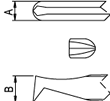Carbon steel is an extremely hard alloy (> 59 HRC) composed of C, Mn, and Si.
While Carbon ensures strong tips, it will nevertheless easily rust. This alloy is
magnetic and cannot be sterilized.
Inox 02 is a standard magnetic stainless steel composed of C, Mn, Cr and Si. This
alloy is not as hard as carbon steels because it contains Chromium. lnox 02 will
resist temperatures of around 400°C (DIN 50 914), but cannot be sterilized.
Inox 08 is a medical stainless steel composed of C, Mn, Cr, Mo and V that provides
an excellent resistance to corrosion and a good resistance to salt. Although not
as hard as Carbon steels, Inox 08 offers excellent resistance to corrosion. This
magnetic alloy supports temperatures of around 400°C (DIN 50914) and is suitable
for autoclave sterilization at 180°C.
Dumoxel is composed of C, Cr, Ni, Mo and Cu and is the most popular alloy among
our customers. This alloy was developed and patented by Dumont to offer the best
in resistance to corrosion thanks to its high concentration of molybdenum and chromium.
Dumoxel also guarantees an excellent resistance to sulphuric environments, hydrochloric
acid, as well as to all other mineral and organic acids. Dumoxel is 95% antimagnetic,
resistant up to temperatures of around 400° C (DIN 50 914) and is suitable for
autoclave sterilization at 270°C.
This Dumont patented alloy is composed of C, Cr, Mo, Mn, Co, Ni and Si. Dumostar
is more elastic and more resistant to corrosion than the best stainless steels.
It is also perfectly compatible with human tissues and is resistant to mineral and
organic acids as well to salt. Although slightly more expensive than other alloys,
Dumostar is 100% antimagnetic and is resistant to sterilization temperatures of
up to 500°C.This is the most cost effective and appropriate alloy for laboratory
use.
Antimagnetic is composed of C, Cr, Ni and Mo. It offers a good resistance to corrosion
thanks to its high concentration of molybdenum and is 80% antimagnetic but is not
as hard as Inox. Antimagnetic is resistant up to temperatures of around 400°C
(DIN 50 914) and is suitable for autoclave sterilization at 270°C.
Titanium is an alloy composed of C, Fe, O, H, N and Ti. It is totally resistant
to corrosion from nitric acid, chloride, salt water, and the like. This alloy is
not as hard as Inox 08 but is 40% lighter and more flexible. Titanium I00% antimagnetic
and resistant up to temperatures of around 430°C.
Nickel is a 100% antimagnetic alloy composed of Cu, Ni, Mn and Zn. lt is widely
appreciated as it does not damage the components handled by it.
Ceramic ZrO2 is even harder than stainless steel and does not contain carbon or
other metal additives. It offers good resistance to chemicals and is Electro Static
Discharge safe. Black Ceramic is antimagnetic ( Zero residual magnetism) and microwave-sterilization
compatible. It does not produce metallic contamination and offers good thermal isolation
for soldering; solder will not adhere to its surface. Black ceramic is clean room
safe and is available in antistatic versions for CMOS.
Ceramic ZrO2 is even harder than stainless steel and does not contain carbon or
other metal additives. It offers good resistance to chemicals and is Electro Static
Discharge safe. White Ceramic is antimagnetic (Zero residual magnetism) and microwave-sterilization
compatible. It does not produce metallic contamination and offers good thermal isolation
for soldering; solder will not adhere to its surface. White ceramic is clean room
safe and is available in anti-static versions for CMOS.
Brass is composed of Cu, Pb, Sn, Ni and Zn. This alloy is 100% antimagnetic and
is widely used for handling delicate components, especially in watch-making.


